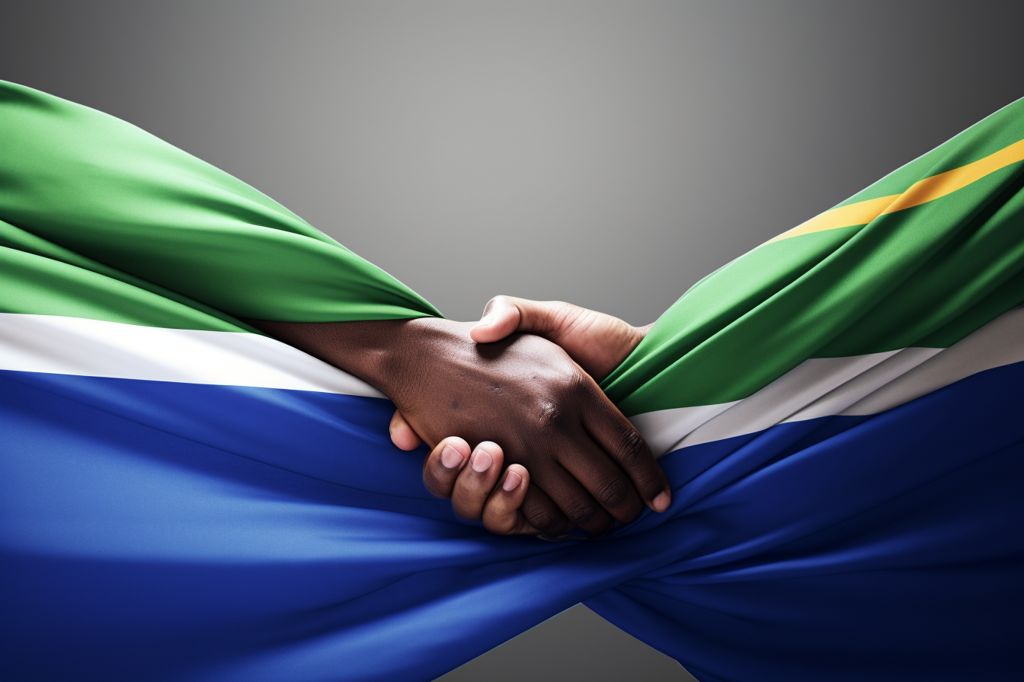South Africa and Lesotho celebrated the official launch of their Bi-National Commission (BNC) during a historic meeting between the two nations’ leaders. The BNC aims to strengthen and integrate the existing economic collaboration between the neighboring countries. Topics discussed included trade facilitation, energy partnerships, and regional developments of mutual interest. Both leaders expressed a commitment to addressing unresolved issues and challenges to ensure seamless trade facilitation and investments. The BNC promises to be a crucial step in fortifying the bilateral relationship, yielding mutual benefits for both nations.
Celebrating a Historic Partnership
In a substantial move towards enhancing South Africa-Lesotho relations, the Prime Minister of the Kingdom of Lesotho, Samuel Ntsokoane Matekane, recently participated in a working visit to the Republic of South Africa. This visit, orchestrated at the request of South African President Matamela Cyril Ramaphosa, signified the official initiation of the Bi-National Commission (BNC) between the neighboring countries.
The leaders of both nations celebrated the establishment of the BNC as a significant and landmark event, highlighting their mutual dedication to advancing and integrating the existing bilateral economic collaboration between their countries. The BNC is the product of a cooperative effort, culminating in the signing of an agreement in November 2021, which upgraded the former Joint Bilateral Commission of Cooperation (JBCC) to a Bi-National Commission.
Notably, the BNC’s launch occured during South Africa’s Heritage Month. Both Heads of State and Government recognized their nations’ shared history, cultural connections, close family ties, and languages.
Progress and Challenges in Bilateral Cooperation
The BNC also serves as a continuation of the deep-rooted bonds of friendship and solidarity formed during South Africa’s battle against colonialism and apartheid. The leaders honored the memory of the 42 South African and Basotho heroes and heroines who perished in the Maseru Massacre in 1982, at the hands of the apartheid regime.
At the Summit, the report of the Council of Ministers was received, acknowledging the Council and the Committee of Senior Officials for their meticulous work in reviewing the decisions of the former JBCC. The Heads of State and Government noted the progress achieved in implementing the JBCC 2020 decisions, including the decision to convert the JBCC into the BNC.
Notable advancements have been made in numerous areas, such as political and strategic cooperation; defense and security; education and training; information, communications, and technology; sports and recreation; trade and industry; migration; social development; water and energy; health and labor, as well as diplomatic consultations.
While the 2001 JBCC framework has shown considerable progress, there are still challenges and unresolved issues that need to be addressed to ensure seamless trade facilitation and investments, and smooth movement of people, goods, and services. Both Heads of State and Government instructed their respective Ministers of Home Affairs to complete work on a new migration model to promote easy movement between the nations.
Enhancing Trade and Expanding Collaboration
In terms of trade facilitation, both countries will accelerate the elimination of technical and non-tariff barriers to trade, including the commercialization of at least two additional border posts. The Summit also praised the flagship collaboration and partnership in the area of water resources for mutual benefit and agreed to investigate further partnerships and collaboration in the field of renewable energy, focusing on hydro, wind, and solar resources.
The BNC also discussed the growing number of formal Agreements and Memoranda of Understanding in various sectors. The Summit instructed the respective Ministers and Senior Officials to hold regular consultative meetings to assess progress in implementing these agreements and review the instruments when necessary.
The Summit approved the decisions and the Joint Action Plan of the Inaugural Session of the BNC, which will act as a tool for monitoring and evaluating progress on the Summit’s decisions under the Bi-National Commission.
Both leaders also debated domestic issues, and regional, continental, and international developments of mutual interest. President Ramaphosa praised Prime Minister Matekane and the people of Lesotho for the progress made towards finalizing the National Reforms Process, reiterating South Africa’s ongoing support in this effort.
Regarding regional, continental, and international developments, both leaders expressed concern about the rise of unconstitutional changes of governments in certain parts of the African continent, the security situation in the Sahel region, Eastern DRC, and the Northern Cabo Delgado Province of Mozambique.
Looking Ahead
In conclusion, Prime Minister Matekane expressed his appreciation for the warm reception and hospitality during his visit and invited President Ramaphosa to attend the Second Session of the Bi-National Commission in Maseru, Lesotho, in 2024. This momentous event promises to be a crucial step in fortifying the bilateral relationship between South Africa and the Kingdom of Lesotho, yielding mutual benefits for both nations.
1. What is the Bi-National Commission between South Africa and Lesotho?
The Bi-National Commission (BNC) is a collaboration initiative between South Africa and Lesotho aimed at strengthening and integrating their existing economic partnership.
2. What topics were discussed during the BNC’s first meeting?
During the first meeting of the BNC, topics such as trade facilitation, energy partnerships, and regional developments of mutual interest were discussed.
3. What is the significance of the BNC’s establishment for South Africa-Lesotho relations?
The establishment of the BNC signifies a significant and landmark event in the deep-rooted bonds of friendship and solidarity formed between South Africa and Lesotho during South Africa’s battle against colonialism and apartheid.
4. What advancements have been made in various areas of cooperation between South Africa and Lesotho?
Advancements have been made in numerous areas, including political and strategic cooperation, defense and security, education and training, information, communications, and technology, sports and recreation, trade and industry, migration, social development, water and energy, health and labor, and diplomatic consultations.
5. What challenges and unresolved issues still need to be addressed in South Africa-Lesotho relations?
There are still challenges and unresolved issues that need to be addressed, such as ensuring seamless trade facilitation and investments, and smooth movement of people, goods, and services. New migration models need to be developed to promote easy movement between the nations.
6. What plans do South Africa and Lesotho have for trade facilitation?
Both countries will accelerate the elimination of technical and non-tariff barriers to trade, including the commercialization of at least two additional border posts.
7. What new partnerships and collaborations will South Africa and Lesotho investigate further?
South Africa and Lesotho will investigate further partnerships and collaborations in the field of renewable energy, focusing on hydro, wind, and solar resources.
8. When will the second session of the Bi-National Commission take place?
The second session of the Bi-National Commission will take place in Maseru, Lesotho, in 2024.








